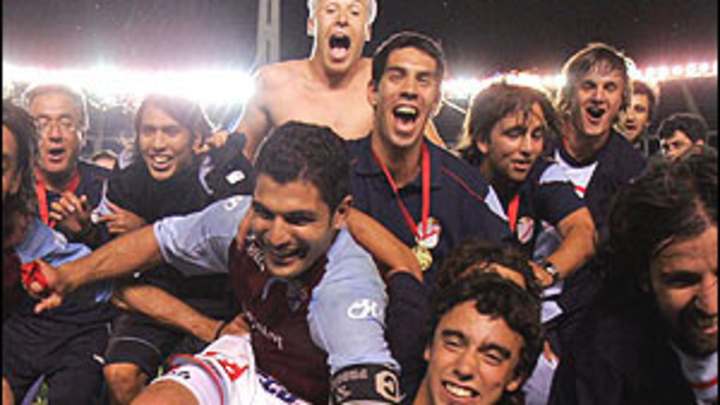Long time coming

After 50 years with nothing to show, Arsenal de Sarandí finally wrote itself into the history books Wednesday night after winning the 2007 Copa Sudamericana in the most dramatic of circumstances.
The tiny Argentine club, which had never challenged for any title in the past, needed a late goal from Martín Andrizzi to beat Mexico's Club América to the title on the away-goals rule in a thrilling finals series that can be compared to the very best the continent has seen in recent years.
Arsenal's story is familiar. Last Friday it picked up an unexpected 3-2 victory over América in Mexico City in the first leg of the final, a result that meant that it only needed a draw in Buenos Aires to close in on the title.
But when Juan Carlos Silva put América up 2-0 with less than 30 minutes remaining in the decider in Avellaneda on Wednesday, it looked like Arsenal's luck had finally run out, and a Mexican club would win the South American competition for a second successive year.
Then Andrizzi appeared. The midfielder, who had only entered the field moments earlier, struggled against the Mexican defense before beating Guillermo Ochoa with a well-placed left-footed shot, the decisive goal that rescued Arsenal and won it the title.
The strike was typical of Arsenal's campaign. The Argentines not only struggled against each opponent they faced, but incredibly, didn't win once at home in five attempts during the tournament.
If it weren't for its amazing away form, Arsenal would have been long gone. But victories over San Lorenzo, Goiás, Chivas de Guadalajara, River Plate (on penalties) and its latest victory against América, indicated that the Argentine minnow was set for greater things.
In truth, Arsenal's campaign was nothing less than magnificent. It came into each one of its matchups as the clear underdog, but its teamwork and determination allowed it to overcome much more traditionally recognized opponents.
Arsenal is by far the least-supported team in the Argentine first division, and attracts only a few thousand fans to home games. When you consider the rivals it dispatched en route to the title, you can get a better idea of what it actually achieved.
Besides Goiás, the rest of its rivals have all won several international trophies in the past, and have fan bases that exceed the one million mark. Arsenal's opponent in the final, América, is not only the wealthiest club in Latin America, but along with Chivas (which Arsenal eliminated in the quarters), is the most supported team in the whole of Mexico.
Much of the credit should be given to the club's manager, Gustavo Alfaro, who got the most out of a squad of players that had never won anything before. He was able to get them playing an effective style of soccer more common with higher-profile teams.
This was clearly demonstrated in the second leg of the final, as a very aggressive Arsenal dominated América, creating numerous scoring opportunities that ended up wearing out a Mexican side that just couldn't find its rhythm.
Arsenal has gone a long way in proving that smaller clubs can come out on top in even the most important international competitions, no matter how difficult it seems. Its Copa Sudamericana success coincides with that of neighbor Lanús, another relatively unknown club, which clinched the Argentine Apertura championship for the first time last Sunday after an equally impressive campaign.
Turning our attention to the Club World Cup in Japan, there's the possibility for another Argentine club to win an international title this year. Boca Juniors are no stranger to international success, and the six-time South American champions will be desperate to win their fourth World Championship.
Boca should fight for the title, along with European champion AC Milan, which boasts newly crowned Golden Ball winner and FIFA World Player of the Year favorite Kaká, as well as former winner of both awards Ronaldo, who should be fit just in time for Milan's debut.
But the Argentines will be without their main inspiration, playmaker Juan Román Riquelme, who recently returned to the club from Villarreal but wasn't short-listed in time for the tournament.
The Argentines are not the same side without Riquelme, and felt his absence as they struggled in an Apertura championship that clearly revealed their weaknesses in the attack and their lack of creativity in the midfield.
Still, Boca is vastly experienced in these types of competitions and is expected to meet Milan in the championship decider on Dec. 16 in Yokohama. This would be an intriguing showdown between the two most internationally decorated clubs in the game's history. (The two last met in '03 for the Intercontinental Cup; Boca beat Milan for the title on penalties after both teams were deadlocked 1-1 after extra time.)
But before Boca's unconfirmed, but already highly anticipated clash with Milan, the Argentines will meet either Étoile du Sahel of Tunisia or Pachuca of Mexico in the semifinals.
Should Pachuca advance, the Mexicans are expected to give Boca a run for its money, after having demonstrated their quality over the last year, with three international titles to its credit (including the '06 Copa Sudamericana).
But the Mexican club has experienced a drastic change in fortune in recent months, and is no longer that same side that destroyed all opposition, as it became the most dominant club Mexico had seen in a number of years.
The fact that Pachuca is low on morale should play in Boca's advantage, as the Argentines are experts when it comes to dominating vulnerable opposition. Veteran striker Martín Palermo, in particular, is the key to Boca's scoring success.
